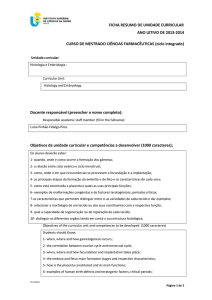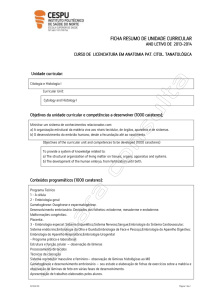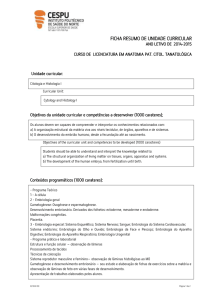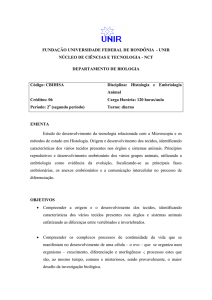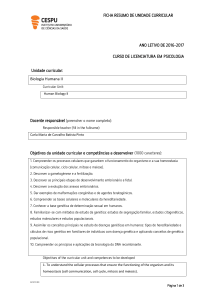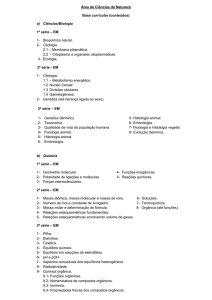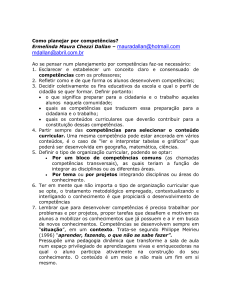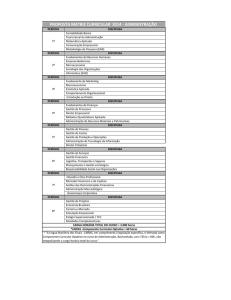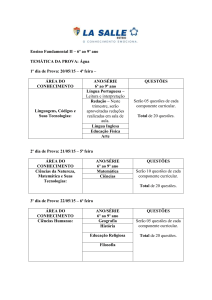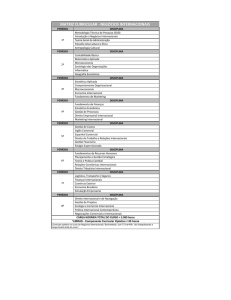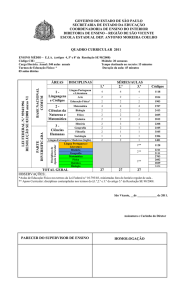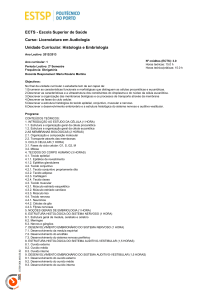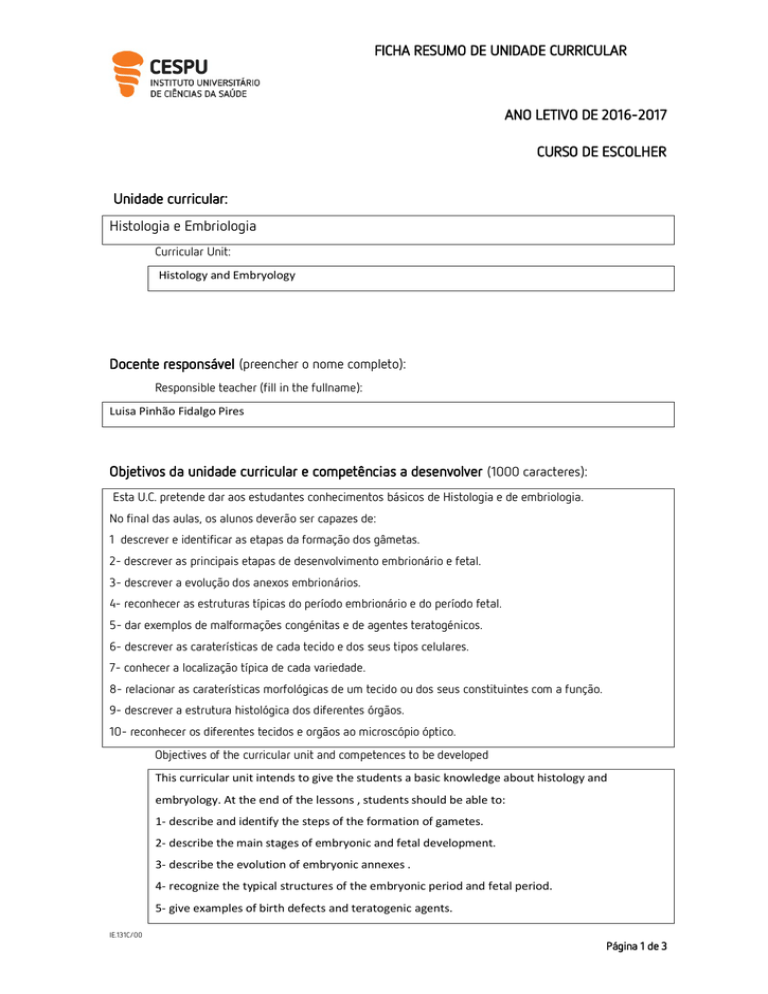
FICHA RESUMO DE UNIDADE CURRICULAR
ANO LETIVO DE 2016-2017
CURSO DE ESCOLHER
Unidade curricular:
Histologia e Embriologia
Curricular Unit:
Histology and Embryology
Docente responsável (preencher o nome completo):
Responsible teacher (fill in the fullname):
Luisa Pinhão Fidalgo Pires
Objetivos da unidade curricular e competências a desenvolver (1000 caracteres):
Esta U.C. pretende dar aos estudantes conhecimentos básicos de Histologia e de embriologia.
No final das aulas, os alunos deverão ser capazes de:
1 descrever e identificar as etapas da formação dos gâmetas.
2- descrever as principais etapas de desenvolvimento embrionário e fetal.
3- descrever a evolução dos anexos embrionários.
4- reconhecer as estruturas típicas do período embrionário e do período fetal.
5- dar exemplos de malformações congénitas e de agentes teratogénicos.
6- descrever as caraterísticas de cada tecido e dos seus tipos celulares.
7- conhecer a localização típica de cada variedade.
8- relacionar as caraterísticas morfológicas de um tecido ou dos seus constituintes com a função.
9- descrever a estrutura histológica dos diferentes órgãos.
10- reconhecer os diferentes tecidos e orgãos ao microscópio óptico.
Objectives of the curricular unit and competences to be developed
This curricular unit intends to give the students a basic knowledge about histology and
embryology. At the end of the lessons , students should be able to:
1- describe and identify the steps of the formation of gametes.
2- describe the main stages of embryonic and fetal development.
3- describe the evolution of embryonic annexes .
4- recognize the typical structures of the embryonic period and fetal period.
5- give examples of birth defects and teratogenic agents.
IE.131C/00
Página 1 de 3
FICHA RESUMO DE UNIDADE CURRICULAR
6- describe the characteristics of each tissue and their cell types.
7- know the typical location of each variety .
8 -relate to morphological characteristics of a tissue or its constituent with the function.
9- describe the histological structure of different organs.
10- recognize different tissues and organs under an optical microscope .
Conteúdos programáticos (1000 caracteres):
1 - Fundamentos de embriologia humana:
1.1 - gametogénese e fertilization.
1.2 - primeira e segunda semanas de desenvolvimento.
1.3 - desenvolvimento embrionário.
1.4 - período fetal. Anexos embrionários.
1.5 -fatores teratogénicos, malformações congénitas.
2 . tecidos histológicos:
2.1 - tecidos epiteliais.
2.2 -tecidos conjuntivos.
2.3 - cartilagem, osso e ossificação.
2.4 - sangue e hematopoiese.
2.5 - tecidos musculares.
2.6 - tecido nervoso.
3 . Histologia dos sistemas orgãnicos:
3.1 - pele e anexos cutâneos.
3.2 - sistema cardiovascular.
3.3 - sistema respiratório.
3.4 - sistema digestivo.
3.5 - sistema urinário.
3.6 - sistema reprodutor.
3.7 - sistema nervoso.
3.8 - sistema endócrino.
Syllabus
1 - Fundamentals of human embryology:
1.1 - gametogenesis and fertilization.
1.2 - the first and the second weeks of development.
1.3 - embryonic development.
1.4 - fetal period. Embryonic annexes.
1.5 - teratogenic factors, birth defects.
2 . histological tissues:
IE.131C/00
Página 2 de 3
FICHA RESUMO DE UNIDADE CURRICULAR
2.1 - epithelial tissues.
2.2 connective tissues.
2.3 - cartilage , bone and ossification.
2.4 - blood and hematopoiesis.
2.5 - muscle tissues.
2.6 - nervous tissue.
3 . histology of organic systems:
3.1 - skin and skin appendages.
3.2 - cardiovascular system.
3.3 - respiratory system.
3.4 - digestive system.
3.5 - urinary system.
3.6 - reproductive system.
3.7 - nervous system.
3.8 - endocrine system.
Referências bibliográficas (bibliography)
(máximo três títulos):
1- Junqueira, L.C. & Carneiro, J. (2008). Histologia Básica, Texto e Atlas (11 ed.). Rio de Janeiro: Guanabara
Koogan.
2- Young, B., Lowe, J.S., Stevens, A. & Heath, J.W. (2008). Wheater Histologia Funcional (5 ed.). Rio de
Janeiro: Elsevier.
3- Sadler,T.W. (2013). Langman Embriologia Médica (12 ed.). Rio de Janeiro: Guanabara Koogan
O regente: (data e nome completo):
IE.131C/00
Página 3 de 3

